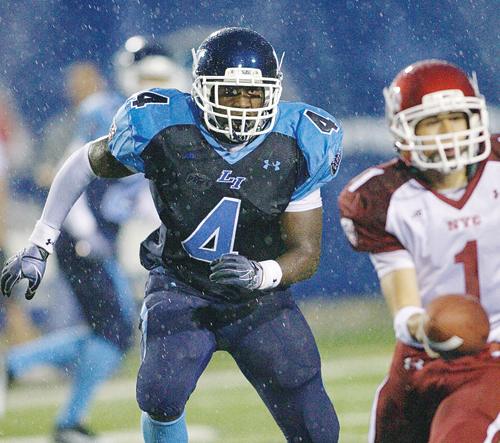Extra Point: Can Malcolm Cater make it back into football?

By now the rise and fall of Malcolm Cater has been well chronicled, a story that appeared to reach its dreaded conclusion when the former standout football player was sentenced to one to three years in prison in October.
From a troubled childhood that included a stray bullet striking the back of his leg during a fight at a house party to a rebirth in Riverhead, where he lived at the Timothy Hill Children’s Ranch and excelled on the football field for the Blue Waves, Cater’s life has been about overcoming adversity.
Now he has a chance to do it again.
Cater was arrested late in 2010 during his freshman season playing football for the Syracuse Orange, where he was quickly earning a reputation as the kind of fierce competitor Riverhead fans saw every week during his years with the Blue Waves.
He had been busted for burglarizing several on-campus apartments. A slew of serious charges followed and a dismissal from the football program. He eventually pleaded guilty to three counts of third-degree burglary and was sentenced to prison.
And at that moment, it seemed like we might have seen the last of Cater, whose potential had all been wiped away by a few mind-bogglingly bad decisions.
During a recent interview with the Associated Press at Moriah Shock Incarceration Correctional Facility in Mineville, N.Y., Cater opened up about what life has been like for him.
“I want to show everyone that the mistake I made was just a bad decision,” Cater said in the interview, which appeared in an array of newspapers and websites Friday, including the Washington Post.
Cater talked about how hard reality hit him when he entered the correctional facility.
He had been given a break and wasn’t going to let that go unnoticed. Rather than being sent to an actual prison, he was ordered to serve in a minimum-security facility that’s known as a “shock camp” for nonviolent criminals.
It was an opportunity for Cater to grow as a person, an example of the penal system working to help someone rather than exacerbating the qualities that sent them there in the first place.
Cater lived in a military environment, according to the AP story, where he worked on academics, received counseling and did tons of physical training.
Cater said in the interview he would run six miles a day on top of other physical training that now has him in the best shape of his life.
Earlier this month Cater was released from the correctional facility without having to serve the minimum one year from his sentence. He has a parole officer in Babylon he reports to as he tries to get his life back on track in the real world.
Will that include football? Possibly.
Cater will turn 21 soon and undoubtedly still has the physical ability to play football at a high level. Where that could be, though, remains to be determined.
Cater said in the interview he’s trying to determine whether he will try to return to Syracuse or go somewhere else.
His journey back to college won’t be anywhere as easy as getting there the first place when a bevy of Big East schools were offering scholarships.
Cater will likely have to start from the ground up, possibly at a small community college where he can prove he’s committed to academics and keeping his life in order. From there, he may find his way back into the college football spotlight.
Some may argue a convicted felon has no place in college football, regardless of circumstances. As a Sports Illustrated/CBS News investigation discovered last year, college football players with a criminal background is hardly a rarity.
After conducting background checks on 2,837 players on the 2010 preseason Top 25 teams, the investigation found seven percent of players has a criminal record. Many were for violent crimes.
There were plenty of examples of players committing crimes similar to what Cater did.
The report shed a spotlight onto the criminal backgrounds of many players, putting a greater emphasis for many schools to thoroughly check potential recruits.
So will a school take a chance on a man like Cater now? Some schools refuse to offer scholarships to anyone convicted of a felony. After serving his time and seeing through the judicial process, does he deserve a chance to play football again?
“This is going to be my last opportunity to make everything right,” Cater said in the AP interview. “I want to be able to show the world that I’m better.”
Anyone from Riverhead who got to know Cater would love to see him make good on those words.
And maybe, there’s still another chapter left to be written in this story.








